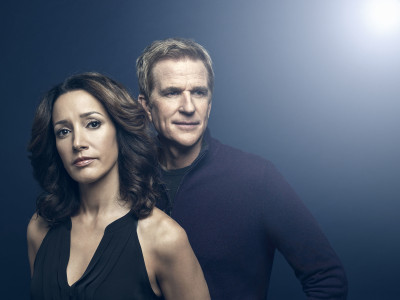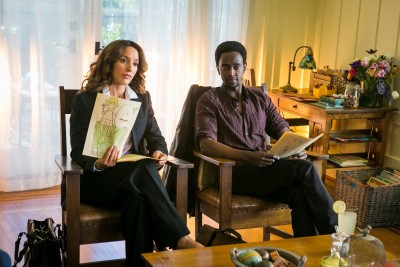TNT’s new series, Proof (Tuesdays, 10/9C) is a kind of supernatural medical mystery tour. It follows Dr. Carolyn Tyler (Jennifer Beals) – a topflight surgeon who, at a pivotal point in her life, is asked by a dying billionaire named Ian Turing (Matthew Modine) to give him proof that there is/isn’t something after death.
His argument for her working on the topic is his knowledge that she had a near death experience in which she saw her late son, Will – something she, being a very hard science person, has rationalized as some sort dream.
TNT made three episodes of Proof available for critics – probably because they encompass three of the most popular settings for situations seen as proof of some form of life after death: a little girl who has a near death experience and has drawn pictures of the things she saw while she was outside her body; a man who sees his late wife and has carried on a relationship with her since her death, and an Iraq veteran suffering from PTSD who has, through hypnosis, remembered events from the Korean – thirty years before he was born.
Carolyn has her own set of problems, too – following Will’s death, she and her husband, Dr. Len Bayliss (David Sutcliffe) broke up; she works too hard, and her relationship with their daughter, Sophie (Annie Thurman) is considerably less than perfect.
In the premiere, Turing arranges a meeting with Carolyn – ostensibly in regard to the possibility of a sizable donation to the hospital – a meeting which her boss, Dr. Charles Richmond (Joe Morton) suggests she take.
Turing, it turns out, is dying and wants to know whether there’s anything after death, or if things just end. He pitches the idea of seeking definitive proof as a scientific quest – a quest that might help Carolyn deal with her own near death experience.
In each of three episodes, Carolyn looks into a different afterlife concept – heaven, ghosts and past lives/reincarnation. Once we get past the exposition heavy premiere, Proof settles into a kind of procedural format, only instead of murders or some other kind of major crime, Carolyn and her assistants – talented intern Dr. Zedan ‘Zed’ Badawi (Edi Gathegi) and Janel Ramsey (Caroline Rose Kaplan) – tackle paranormal/supernatural events.
The basic format of the show is to establish a subject to be investigated, have Carolyn dismiss it out of hand before some detail catches her eye and makes her rethink her position and, finally, either accept the event – having established it is as it seemed at first glance; find a reason for it in real world terms (disprove it), or have it fall into a middle category of being unable to either prove or disprove it.
It seems pretty straightforward – except for the fact that proof (or disproof) is not easy to find. Even if everything points to an event having actually taken place, where’s the physical, empirical evidence?
The next problem is trying to balance a show that features medical practitioners and what some might call woo-woo without getting preachy, maudlin or laughable. It’s the kind of idea that made what The X-Files accomplished so highly regarded.
The premiere of the series is pretty good television but it doesn’t quite feel right. The script, by series creator Rob Bragin, never comes off as preachy or patronizing, but the amount of exposition required to get the series up and running never really gives the investigatory part of the show enough time to really connect. It’s certainly good enough to keep its audience intrigued.
The second episode, Til Death, perhaps lays on the woo-woo a bit too much – though it’s done so matter-of-factly that it, too, is more than adequate to maintain audience interest.
It’s the third episode, Showdown, where science, woo-woo and character all come together in just the right balance and Proof starts to kick a little serious metaphysical butt.
Final Grade: B+
Photos by Ed Araquel and Jamie Dittinger/Courtesy of TNT

